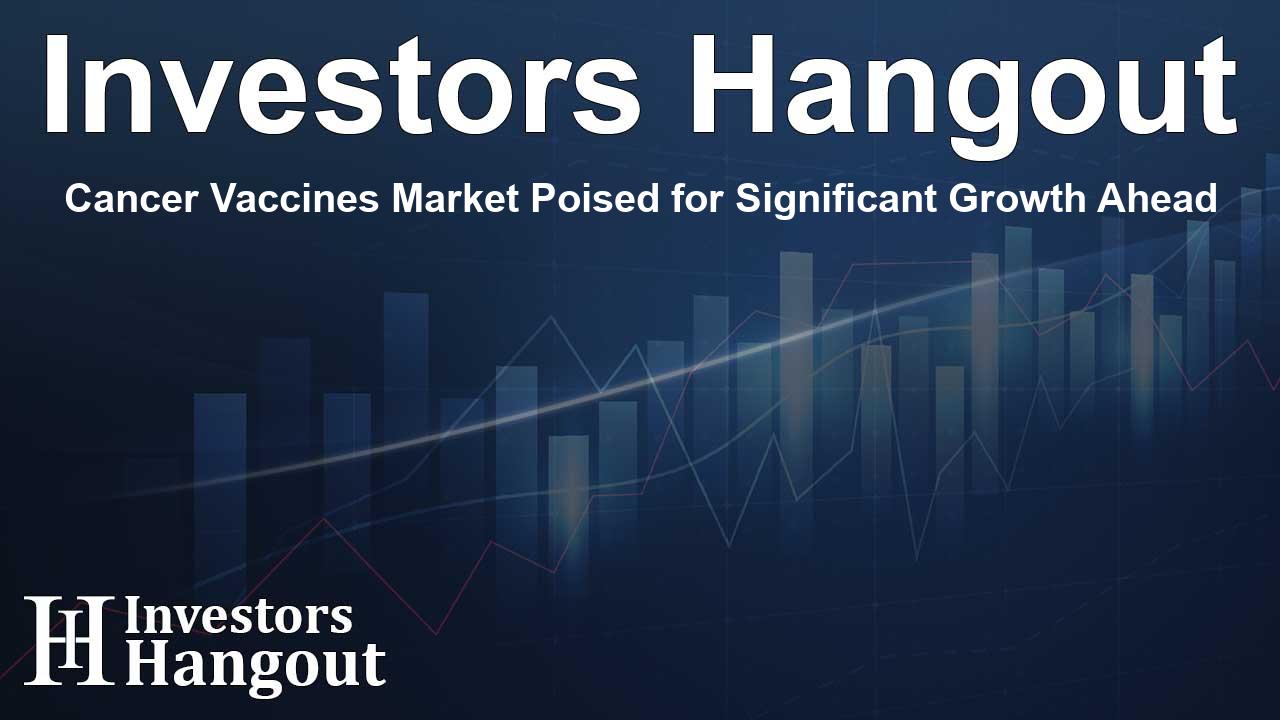Cancer Vaccines Market Poised for Significant Growth Ahead

Overview of the Cancer Vaccines Market
The global cancer vaccines market, currently valued at US$10.23 billion, is set for a remarkable expansion. With a compound annual growth rate (CAGR) of 8.6%, the market is anticipated to reach US$20.47 billion by 2032. This growth trajectory highlights increased investments in research and development, particularly in the realm of neoantigen Cancer vaccines, along with significant advancements in technology.
Factors Driving Market Growth
Several key factors contribute to the rising demand for cancer vaccines. Firstly, the ongoing shift towards preventive healthcare has made it imperative to introduce innovative solutions that can proactively combat illnesses like cancer. Coupled with the alarming rise in cancer incidents, these factors are fostering an environment ripe for market growth.
Investment in Research and Development
Investing in the research and development of neoantigen vaccines is at the forefront of this market surge. These vaccines work by targeting unique antigens expressed by cancer cells, thereby enhancing the body’s immune response specifically against cancer.
Technological Advances
Technological advancements significantly influence market dynamics. Innovations in vaccine delivery mechanisms and therapeutic approaches are rendering cancer vaccines more effective, safe, and accessible. These advancements are essential for improving the efficacy of existing vaccines and are a critical aspect of ongoing clinical trials.
Market Segmentation by Vaccine Type
The cancer vaccines market can be segmented into two main categories: preventive and therapeutic vaccines. Preventive vaccines have dominated the market due to the successful adoption of HPV vaccines and Hepatitis B vaccines, effectively lowering the risk of cancer. On the therapeutic front, vaccines aim to treat existing cancers, with notable products like Sipuleucel-T proving impactful.
Insights by Vaccine Technology
Regarding vaccine technology, the market includes cell-based vaccines, recombinant vaccines, and others. Among these, recombinant vaccines have captured the largest market share, attributed to their cost-effectiveness and scalability. Their ability to target multiple tumor-associated antigens through a streamlined production process makes them increasingly preferable.
Regional Markets and Dynamics
The global cancer vaccines market is further categorized by region: North America, Europe, Asia Pacific, Latin America, and the Middle East and Africa. In 2023, North America was the leading region, necessitated by high demand and adoption of innovative treatment protocols. The combination of rising cancer rates and a growing emphasis on immunotherapy adds momentum to this market segment.
North America's Dominance
In North America, the prevalence of cutting-edge cancer therapies and favorable reimbursement policies for vaccine treatments contribute significantly to sustained growth. Public health initiatives focusing on cancer awareness also play a notable role in increasing vaccinations.
Key Players Shaping the Market
The cancer vaccines market is characterized by a competitive landscape, with prominent players striving to enhance their market presence. Notable companies include Merck & Co., Inc., GSK plc, Dendreon Pharmaceuticals LLC, and others. These companies form strategic partnerships and continue to innovate their product lines to lead in this rapidly evolving sector.
Merck & Co., Inc. Innovations
Merck, a top contender in this field, has made substantial strides through collaborations and advanced research. Their partnership with Moderna to develop mRNA-based cancer vaccines showcases their commitment to leveraging next-generation technologies. Recently initiated Phase 3 trials further solidify their role in spearheading innovative therapies.
GSK plc Initiatives
GSK plc is also known for its contributions to the oncology vaccine market. Their dedication to addressing unmet medical needs through innovative drug development underscores their strategic positioning in the cancer vaccine landscape, especially concerning HPV-related cervical cancer.
Future Outlook and Conclusion
The future of the cancer vaccines market looks bright, driven by continuous innovations and a growing focus on preventative healthcare. As technologies evolve and awareness increases, there will likely be an even greater push towards vaccine adoption, making significant strides against various types of cancer. With the backing of major companies and ongoing research, this market is well-positioned for impressive growth in the years to come.
Frequently Asked Questions
What is the current value of the cancer vaccines market?
The cancer vaccines market is currently valued at US$10.23 billion.
What is the projected growth rate for the cancer vaccines market?
The market is expected to grow at a CAGR of 8.6% over the next few years.
Which companies are leading the cancer vaccines market?
Key players include Merck & Co., Inc., GSK plc, and Dendreon Pharmaceuticals LLC, among others.
What are the main types of cancer vaccines?
Cancer vaccines are primarily categorized into preventive and therapeutic vaccines.
How does technology impact the cancer vaccines market?
Technological advancements enhance vaccine efficacy, production processes, and delivery mechanisms, fueling market growth.
About Investors Hangout
Investors Hangout is a leading online stock forum for financial discussion and learning, offering a wide range of free tools and resources. It draws in traders of all levels, who exchange market knowledge, investigate trading tactics, and keep an eye on industry developments in real time. Featuring financial articles, stock message boards, quotes, charts, company profiles, and live news updates. Through cooperative learning and a wealth of informational resources, it helps users from novices creating their first portfolios to experts honing their techniques. Join Investors Hangout today: https://investorshangout.com/
Disclaimer: The content of this article is solely for general informational purposes only; it does not represent legal, financial, or investment advice. Investors Hangout does not offer financial advice; the author is not a licensed financial advisor. Consult a qualified advisor before making any financial or investment decisions based on this article. The author's interpretation of publicly available data shapes the opinions presented here; as a result, they should not be taken as advice to purchase, sell, or hold any securities mentioned or any other investments. The author does not guarantee the accuracy, completeness, or timeliness of any material, providing it "as is." Information and market conditions may change; past performance is not indicative of future outcomes. If any of the material offered here is inaccurate, please contact us for corrections.